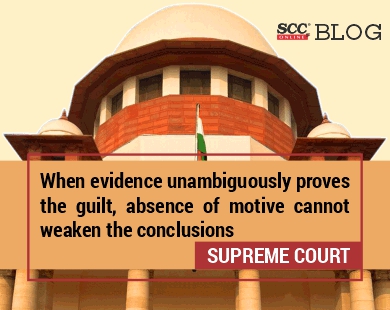Supreme Court of India: In a criminal appeal challenging the High Court’s confirmation of the Trial Court’s conviction and sentencing, the division bench of Dinesh Maheshwari* and Sudhanshu Dhulia, JJ. dismissed the same, and held that the prosecution’s case is amply established by cogent and convincing chain of circumstances pointing only towards the appellant’s guilt, who caused the death of victim children, his sons, by strangulation and also caused the evidence of offence to disappear by throwing the dead bodies into the canal.
The Trial Court had passed a judgment of conviction and order of sentence against the appellant, holding him guilty of offences punishable under Sections 302 and 201 of the Penal Code, 1860 for strangulating his sons aged 6 and 9 years, throwing their bodies into the canal and projecting the same as accidental drowning. Trial Court’s decision was confirmed by the High Court during appeal. Challenging the concurrent findings of Trial Court and High Court before the Supreme Court through the present appeal, the appellant pointed towards the unsupported story of strained relationship with wife, lack of motive to kill own sons and omission to examine appellant’s mental capacity.
The Court referred to Pappu v. State of U.P., for determining the matters to be examined in a Special Leave under Article 136 of Constitution of India wherein, it was held that only findings calling for interference may be reappreciated to prevent grave or serious miscarriage of justice. The principles related to circumstantial evidence, burden of explanation, hostile witnesses and motive were discussed in accordance with the facts of the present matter through Sharad Birdhichand Sarda v. State of Maharashtra, for establishment of facts through circumstantial evidence including false defense.
While taking note of Section 106 of Evidence Act, 1872, the Court referred to Trimukh Maroti Kirkan v. State of Maharashtra, (2006) 10 SCC 681, Sudru v. State of Chhattisgarh, (2019) 8 SCC 333 and Sabitri Samantaray v. State of Odisha, 2022 SCC OnLine SC 673 for principle to be followed in case of false explanation by the accused and his burden of proof. The Court also referred to Anwar Ali v. State of H.P., (2020) 10 SCC 166 for principles enunciated regarding relevancy of motive.
The Bench found no substance in the appellant’s contentions against the concurrent findings of the Trial Court and High Court. Based on evidence on record and surrounding factors, the Court was satisfied with the establishment of a chain of circumstances under Section 106 of Evidence Act operating heavily against the appellant. The Court held that the motive not being proved cannot displace or weaken the conclusions naturally flowing from the evidence.
The Court said that the law mandates the Courts to presume absence of circumstances for bringing the case within any of the General Exceptions in IPC, and that nothing in the present case shows the appellant being medically treated as a person of unsound mind.
The Court reiterated that “the burden of proving the existence of circumstances, so as to bring the case within the purview of Section 84 IPC lies on the accused in terms of Section 105 of the Evidence Act; and if the accused is charged of murder, the burden to prove that as a result of unsoundness of mind, the incapability of knowing the consequences of his acts ,are on the defense, as duly exemplified by illustration (a) to the said Section 105 of the Evidence Act”.
The Court viewed that the appellant was neither suffering from any medically determined mental illness nor could be said to be a person under a legal disability of unsound mind. Hence, neither Section 84 IPC applies to the present case nor Section 329 CrPC would come to the rescue of the appellant.
The Bench concluded that there was no infirmity in the concurrent findings of the Trial Court and High Court. It refused to give benefit of Section 84 of IPC or Section 329 of Code of Criminal Procedure, 1973 or interfere in the present matter and therefore dismissed the present appeal.
[Prem Singh v. State of NCT of Delhi, 2023 SCC OnLine SC 2 , decided on 2-01-2023]
*Judgment by: Justice Dinesh Maheshwari
Advocates who appeared in this case :
For Appellant: Advocate on Record Nidhi, Advocate Shikil Shiv Suri, Advocate Madhu Suri, Advocate Jyoti Suri, Advocate Mahima Aggarwal, Advocate Komal Gupta, Advocate Nikita Thapar, Advocate Vinishma Kaul, Advocate Shilpa Saini;
For Respondent: Advocate on Record Shubhranshu Padhi, Advocate Vishal Banshal, Advocate Rajeshwari Shankar, Advocate Niroop Sukirthy, Advocate Mohd Ovais, Advocate Ashish Yadav, Advocate Rakshit Jain, Advocate on Record Munawwar Naseem, Advocate Dhaval Nanavati, Advocate Ruchi Khurana, Advocate Sanjna Dua, Advocate on Record Chirag M. Shroff, Advocate Rahul Chitnis.







